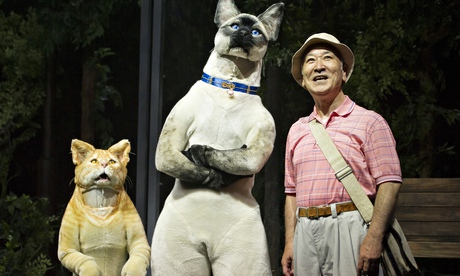
The great Japanese director Yukio Ninagawa, now 79, has given us some memorable productions over the years. But even by his standards, this version of Haruki Murakami’s 2002 novel is quite something. A complex narrative is rendered through multiple scenes all set in giant plastic cubes that glide about the stage like phantasmagoric art installations, with the aid of a heroic army of scene-shifters.
Not having read Murakami’s novel, I can’t comment on the fidelity of Frank Galati’s adaptation. What we see are two parallel, ultimately interrelated stories. In one, a 15-year-old boy calling himself Kafka, after his literary hero, runs away from home in a quest to find his mother and sister. In the other, an old man named Nakata, seemingly endowed with mystical powers after a mysterious childhood accident, pursues his mission to trace lost cats. In one of the most telling juxtapositions of the two stories, the studious Kafka dwells on the Nazi Adolf Eichmann’s mechanistic approach to mass murder, while Nakata shows instinctive human compunction over the need to dispose of a cat-killer.
Even if the narrative is top-heavy with themes and ideas, including the circularity of time and the shifting nature of identity, the staging is riveting. Ninagawa and his designer conjure up a world poised between reality and dream, which embraces everything from wild forests to neon-lit urban hells, and introduces characters ranging from talking cats to Hegel-quoting sex-workers. Nino Furuhata as Kafka, Rie Miyazawa as the mother he Oedipally desires and Katsumi Kiba as the cat-seeking holy fool are all impressive, but it is the black-clad stagehands who deserve the loudest applause for making Ninagawa’s vision possible. The play quotes Yeats’s epigram that “in dreams begin responsibility”. One might add that dreams can also end in a sensuous theatrical spectacle.
• At the Barbican, London, until 30 May. Box office 0845 120 7511.

